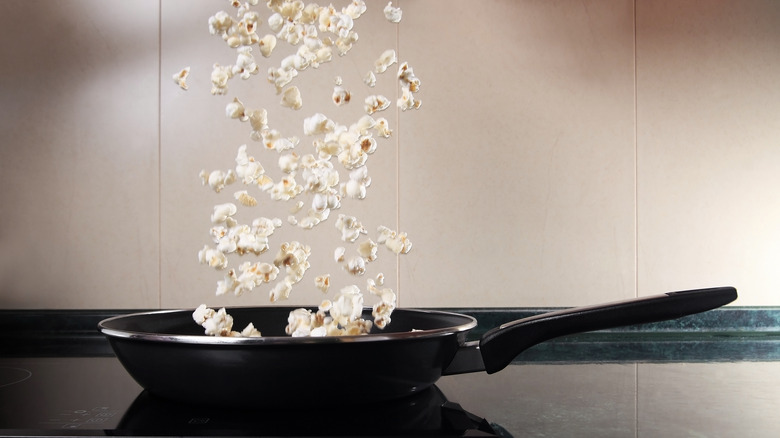The Oil Mistake You're Probably Making When Cooking Popcorn On The Stove
Found in fossils of ancient American civilizations, popcorn is a snack that has undeniably stood the test of time. It's one of the most beloved snacks in the United States; the Popcorn Board estimates that Americans consume 14 billion quarts of the stuff every year.
And it's no wonder it's so heavily consumed —popcorn has become a cornerstone of American culture. From movie theaters to sports stadiums, you can smell the salty, buttery, freshly popped kernels pretty much everywhere.
Today, pre-popped bags and microwave packs line grocery store aisles, allowing popcorn lovers to enjoy the stuff at their convenience. Those who prefer a more authentic popcorn experience, though, may take it the old-fashioned way: fresh off the stove. This old-school method is pretty straightforward. But if you're trying it for the first time, there are some tips you may want to consider so you can cook up the best results.
Avoiding an oil fiasco
If you have some extra time (and kernels) on your hands, making popcorn at home is surprisingly simple and yields irresistibly fresh results. Not to mention, stove-top popcorn is almost 10 times cheaper than store-bought bags and microwave sachets. With a couple of kitchen essentials — oil and a pan — you can have freshly popped popcorn in mere minutes.
The most important factor to consider during the cooking process is the ratio of kernels to oil. You may be inclined to give the pot a generous pour of oil. But as Reader's Digest explains, "kernels that are saturated with oil won't pop properly. And when they do pop, they'll explode right into a pool of oil, which will leave them soggy and sad."
It's better to start out with just enough oil to coat the bottom of the pan, or two tablespoons for every half-cup of kernels.
The proof is in the popcorn
Aside from using the amount of oil for popping, another consideration of stove-top popcorn is how best to flavor it. And this aspect, of course, is of utmost importance. One of the most obvious benefits of home-popped popcorn is that it allows the popper total creative control over the ingredients.
Popcorn's mild taste makes it the perfect vessel for any and all flavors — sweet, salty, spicy, even sour. If you find yourself in a popcorn rut, a quick internet scan can inspire you with endless popcorn recipes and flavor ideas.
Free from chemicals and plastic bags, the stovetop method brings popcorn back to its roots. Making popcorn on the stove may seem like a dying art in the age of microwave sachets and pre-popped family bags. But the proof is in the pudding ... or popcorn. Nothing can truly match up to a warm bowl of popcorn, made as the popcorn gods intended.


